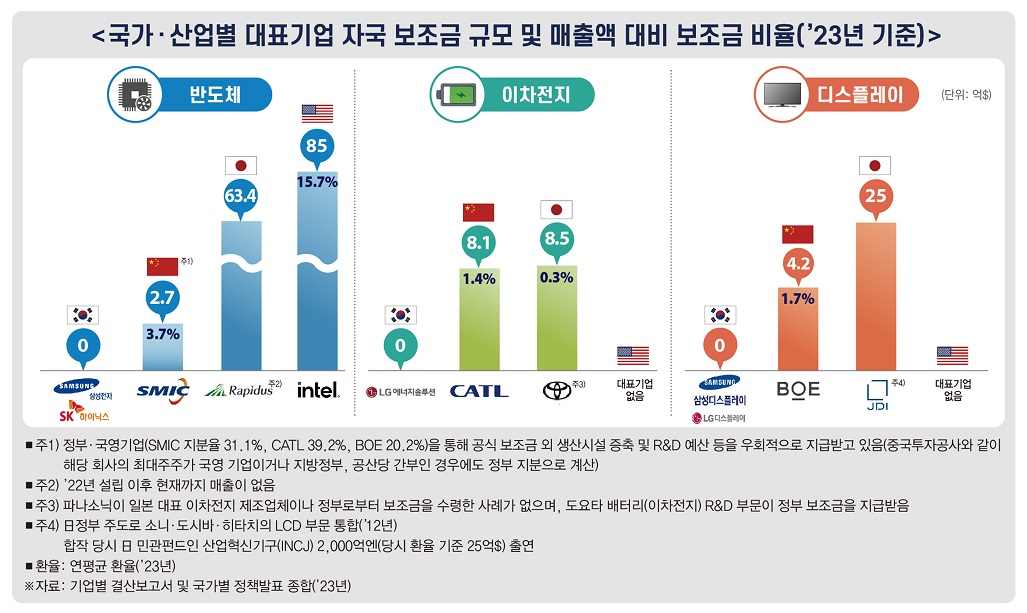한국경제인협회는 최근 미·중 기술 패권 경쟁에 따른 글로벌 공급망 재편 및 주요국의 산업정책으로 인해 세계시장에서 우리 기업들의 입지가 줄어드는 점은 성장잠재력 하락 추세에 비추어 매우 우려되는 상황이라고 전했다. 특히 경쟁국들이 민관 협력을 크게 강화하는 반면 우리의 산업경쟁력은 상대적으로 약화되는 상황을 문제라 인식해 ‘주요국 첨단산업별 대표기업 지원정책 비교’를 통해 한국의 정책 지원이 미국, 중국 및 일본에 비해 부족한 실정임을 밝혔다.

▲자료 : 한국경제인협회
미중일 경제 안보 차원 수십조 지원
직접 지원 글로벌 공급망 차원 중요
경제안보 차원에서 수십조를 반도체 등 첨단 산업에 지원하는 미국, 중국, 일본과 달리 우리나라는 첨단산업에 대한 보조금에 인색해 국가 첨단전략산업에 해당하는 반도체, 이차전지 및 디스플레이 산업에 대한 국가 차원 지원강화 방안 마련이 시급하다는 주장이 제기됐다.
한국경제인협회는 최근 미·중 기술 패권 경쟁에 따른 글로벌 공급망 재편 및 주요국의 산업정책으로 인해 세계시장에서 우리 기업들의 입지가 줄어드는 점은 성장잠재력 하락 추세에 비추어 매우 우려되는 상황이라고 7일 전했다.
특히 경쟁국들이 민관 협력을 크게 강화하는 반면 우리의 산업경쟁력은 상대적으로 약화되는 상황을 문제라 인식해 ‘주요국 첨단산업별 대표기업 지원정책 비교’를 통해 한국의 정책 지원이 미국, 중국 및 일본에 비해 부족한 실정임을 밝혔다.
미국·중국·일본은 경제안보 차원에서 반도체 지원을 강화 중이다. 미국 바이든 대통령은 2022년 칩스법 서명식에서 미국의 국가안보는 반도체 산업에 달려있다고 하며, 같은 해 10월 반도체 수출통제 개정 조치로 대중 반도체 수출통제를 강화했다. 이와 함께 아시아 국가에 의존하던 반도체 생산을 자국에서 해결하기 위해 인텔에 85억 달러 보조금 투입 계획도 발표했다.
중국은 반도체 수급의 높은 대외의존도를 약점으로 인식하며, 반도체 자급률을 70%까지 높이기 위해 2023년부터는 반도체 대표기업 SMIC에 2.7억 달러의 보조금 지급을 시작했다. 이에 더해 정부가 대주주(지분비율 30% 이상)로서 정부 주도의 투자 및 연구개발에도 박차를 가하고 있다.
일본 정부는 반도체 산업 재부흥을 목적으로 연합 반도체 기업인 라피더스 설립에 63억 달러가 넘는 보조금을 이미 투입했고, 최근 일본 경제산업성은 추가 지원방안까지 고려 중인 것으로 알려졌다.
미국은 뚜렷한 이차전지 대표기업이 없어 전기차 시장 보호로 중국에 대응하고 있다. IRA(인플레이션 감축법)의 전기차 보조금을 통해 미국 내 생산을 유도함으로써 이차전지 생산 밸류체인 구축을 위해 노력하고 있다. 2차전지 부품 최소 50% 이상이 북미 지역에서 생산·조립된 경우 등에 한해 보조금을 지급하기 때문에, 미국이라는 거대시장을 간과할 수 없는 타국 이차전지 업체는 현지 생산을 검토하게 된다. 실제로 CATL 및 LG에너지솔루션 등 많은 기업들이 미국내 생산공장을 건설했거나 계획 중이다.
중국 정부의 이차전지 산업 지원은 1990년 제8차 5개년 계획에서 시작됐다. 중국 정부는 현재 글로벌 시장 점유율 1위인 CATL에 2011년 설립 당시부터 최근까지 각종 지원을 하고 있으며, 보조금 지급 범위를 전고체 배터리 연구개발로 확대해 전고체 배터리 시장에서도 선두를 점하고자 한다.
일본 또한 최근 이차전지 산업 투자를 강화하고 있다. 한국·중국산 이차전지가 시장을 주도하자 일본 정부가 이차전지를 에너지 정책과 경제안보 문제로 인식, 도요타에 8.5억 달러 규모의 이차전지 연구개발 보조금 지급을 결정했다. 또한, 국내 이차전지 생산시설 확보에도 보조금을 지급하기 시작했다.
이에 반해 한국은 반도체 산업에 이어 이차전지 산업에도 보조금 지급 정책은 현재까지 없는 실정이며, 한국 주요 생산 3사(LG에너지솔루션·SK온·삼성SDI) 세계 시장 점유율은 2021년 30.2%에서 2022년 23.7%, 2023년 23.1%로 불과 2년 만에 7.1%p 하락했다.
한동안 세계시장을 석권했던 한국 LCD 제품은 중국 정부가 2012년부터 ‘전략적 7대 신성장산업’ 중 하나로 디스플레이 산업을 선정해 대규모 보조금을 투입한 이후부터 가격경쟁력을 상실한 것으로 평가받고 있다.
한국은 현재 높은 기술력이 요구되는 OLED 부문에서 중국 대비 미세한 우위를 점하고 있으나, 이마저도 중국의 대규모 보조금과 투자 앞에 위태로운 상황이다. 중국 정부는 2023년에 중국 대표 LCD 및 OLED 생산업체인 BOE에 4.2억 달러 규모의 보조금을 지급했고, 토지·건물 무상 제공과 지방정부 출자와 같은 지원주9)까지 제공 중이다.
일본 정부는 2012년 당시 25억 달러 규모의 보조금으로 디스플레이 산업 경쟁력 회복에 나섰으나, 2000년대 초반부터 OLED에 선제적 투자를 단행한 한국 기업과 달리 투자 적기를 놓침으로써 2014년부터 현재까지 적자를 이어오고 있다. 이처럼 한국 디스플레이 산업 또한 적기 지원이 이루어지지 않는다면 OLED 시장까지 중국에 주도권을 내줄 수 있다는 우려가 존재한다.
주요국의 반도체·이차전지·디스플레이 산업정책 공통점은 정부개입으로 경제성장을 달성하려는 것이다. 특히 보조금 정책이 주로 활용되고 있는데 이는 선점효과와 승자독식 양상을 보이는 첨단산업에서 가격경쟁력과 기술력 확보에는 보조금 정책이 효과적이기 때문이라 볼 수 있다.
한국은 기업 대상 세액공제와 같은 간접적인 지원에 집중 중인데, 주요국 산업정책 동향과 금년도 세부 부족 상황을 고려하여 생산 기반의 국내 유치와 연구개발 등을 위해 미국이 시행 중인 직접환급(Direct Pay) 제도와 같은 정책 지원에 나설 필요가 있다.
한경협은 정부의 재정건전성 유지 필요성에 공감하나, 첨단산업에 대한 보조금 등 정부 지원은 소비지출로 인한 부채 증가와 달리 미래 먹거리를 위한 투자이며 이는 국민경제에 매우 중대한 영향을 미칠 것임을 강조했다.
미국과 중국 및 일본은 모두 경제안보 컨트롤 타워를 강화했다. 미국은 2021년 백악관 과학기술정책실장을 장관급으로 격상, 단일 조직에서 산업과 안보 정책을 추진 중이다. 중국은 총리 산하였던 과학기술부를 작년에 국가주석이 관할 하는 당 중앙위원회(중앙과학기술위원회)로 격상함으로써 지도부가 직접 과학기술 정책을 총괄한다.
일본 또한 중국의 희토류 수출제한 이후 경제안보 역량을 지속해서 강화해 왔다. 2021년 장관급 조직인 경제안보담당관실을 설치하여 총리 주도의 범부처 통합 대응체계를 구축한 것이 대표적이다. 이처럼 주요국은 일원화된 경제안보 컨트롤 타워를 토대로 정책을 추진하고 있다.
이상호 한경협 경제산업본부장은 “주요국들의 반도체·이차전지·디스플레이에 대한 지원정책 강화는 첨단산업 주도권 상실이 곧 국가안보 위협이라는 위기의식이 작용한 결과”라며 “급격한 기술발전과 공급망 재편에 선제적이고 효과적인 대응이 필요한 시점에 이들 첨단산업에 대한 투자는 안보는 물론 재편되는 글로벌 공급망에서 한국이 중추적인 역할을 수행하는데 반드시 필요”하다고 강조했다.
아울러 “한국도 관련 기업이 글로벌 경쟁력을 확보할 수 있도록 과감한 재정지원 방안을 수립해야 하고, 일원화된 컨트롤타워를 통한 관련 법·제도 정비가 필요하다”고 말했다.
